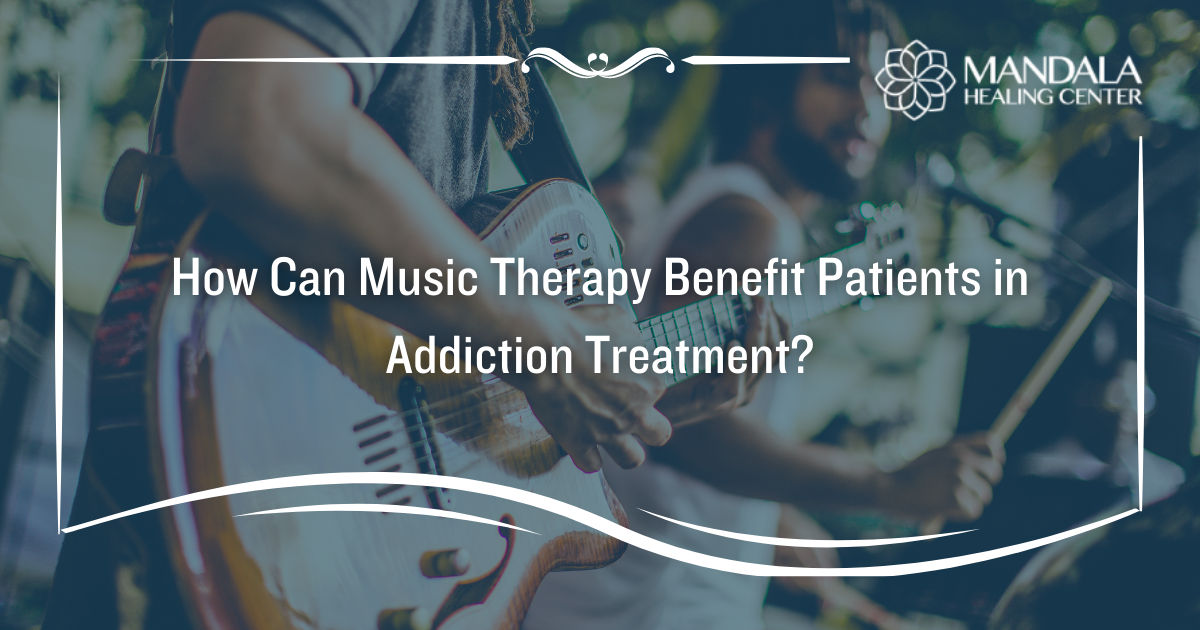Addiction affects every aspect of people’s lives. It harms people’s bodies and minds, leads to destructive behavior with legal, social, and financial consequences, and damages relationships. Because addiction affects all parts of a person’s life, substance abuse treatment must provide opportunities for whole-person healing. It is not enough to simply go through detox. People must get the support and skills they need to heal their body, mind, and spirit.
Music therapy has been used to treat a range of medical and mental health conditions, including substance abuse disorders. The benefits of music therapy have been shown to improve outcomes in addiction treatment and can be used as part of an effective aftercare plan.[1] Learning as much as you can about the types of therapies that may be used during an addiction treatment program can help you make informed decisions about your care.
At the Mandala Healing Center, we know that people with addiction must get compassionate, high-quality care so that they can overcome addiction. We offer a range of programs that are carefully designed to give people what they need to move forward into a healthy, sober lifestyle. If you or someone you love needs addiction treatment, reach out to our staff today.
What Kinds of Music Therapy are Used in Addiction Treatment?
Music treatment is used in a variety of substance abuse treatment settings, including inpatient and residential programs and outpatient treatment. While there are many ways to use music therapy, it is generally offered in two categories: receptive music therapy and active music therapy.
Receptive Music Therapy
During this type of therapy, patients may listen to music chosen by the therapist. They may talk or journal about the feelings or memories that are triggered by the music. The therapist may guide the patient through relaxation exercises while listening to music.
Active Music Therapy
This type of therapy encourages people to get in touch with their self-expression by engaging with music in a meaningful way. Patients may dance, sing, write music or choreography, or create art that includes music. People may also play music on a guitar, piano, drums, or other instruments that allow freedom of expression.
People in addiction treatment can use music therapy as part of their treatment plan and aftercare plans if it is beneficial to them.
The Goal of Using Music Therapy in Substance Abuse Treatment
Holistic therapies are often used in addiction treatment to help facilitate whole-person healing. Music therapy is often thought of as simply a holistic practice, but it often uses evidence-based techniques to achieve measurable positive results.
The goal of music therapy during drug and alcohol rehab is to help people heal from the symptoms of withdrawal and to gain new skills and coping mechanisms that can help them avoid relapse in the future. Other goals of incorporating music therapy in addiction treatment programs include:
- Relaxation
- Increased well-being
- Lowered stress
- Improved communication
- Distraction from emotional or physical pain
Often, holistic therapies are considered “breaks” from the rigors of treatment. But holistic therapies, including music therapy, can often provide many important benefits that extend into the rest of the addicted person’s life.
Reported Benefits of Music Therapy in Addiction Treatment
People who have used music therapy in addiction treatment report many benefits that help them heal from addiction and find joy in a healthy, sober lifestyle. Some of these benefits include:[2]
- Increased self-esteem
- Less muscle tension
- Decreased agitation
- Reduced anxiety
- Better group dynamics
- More self-expression
- Better ability to self-soothe
- Increased coping
- More motivation
While many people may experience music therapy for the first time during addiction treatment, some find it helpful as a part of their aftercare plan, too. People may find ways to incorporate music into their daily lives by joining a community choir or dance class or playing an instrument, or they may continue to work one-on-one with a music therapist.
How to Incorporate Music Therapy into Rehab and Recovery
You can gain the benefits of holistic therapies by choosing a holistic addiction treatment program that includes them in patients’ treatment plans. Addiction treatment generally happens in stages, starting with detox. During detox, people are monitored and treated for their withdrawal symptoms. In some programs, holistic practices may be used to support whole-person healing during detox.
More commonly, music therapy and other holistic therapies are used alongside evidence-based treatments as part of a patient’s individualized program. They may participate in a variety of treatments throughout their time in treatment, including:[1]
- Individual therapy
- Group support
- Medication management
- Family therapy
- Holistic practices
- Education
- Aftercare planning
Music therapy can be used to provide healing at any level of care and in every treatment setting. For many, it is an important part of overcoming addiction and finding purpose in life after treatment.
Learn More About the Addiction Treatment Programs at the Mandala Healing Center
If you or a loved one needs addiction treatment or support during recovery, reach out to the staff at the Mandala Healing Center. Addiction can feel lonely, but you are not alone. To learn more about our comprehensive, holistic programs, call today.
References:












